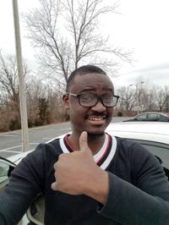Visa Rules Discourage U.S. Development of App to Help the Blind
Date: August 5, 2017
When 26-year-old computer scientist Oluwatosin Oluwadare invented EyeCYou, an app that uses sophisticated image-processing software to help the visually impaired, he thought it would be straightforward to start a company in the United States. But Oluwadare is a Nigerian, in the country to earn a PhD. “Being on a student visa, you cannot work outside of school for anyone,” he says. “So even if I could form a company, I could not work in it.” Investors, meanwhile, are unwilling to bankroll a company that has a founder who cannot legally work in the United States.

This is all despite significant interest in EyeCYou, which gives users descriptions of the people they encounter: The names of friends, the gender and approximate age of strangers, and even details such as clothing color and facial expression. All these cues, Oluwadare says, are vital to people who have lost their vision. In the last few years, he has demonstrated the product at dozens of pitch competitions, including the U.S. Microsoft Imagine Cup, where he was a finalist. Everywhere he presents, people ask when the app will be available for sale.
All he can tell them is: I do not know. Likely, he will have to defer starting his business, perhaps until he returns to Nigeria. This would be a huge loss for Oluwadare and for the United States. “America is the best place for a computer scientist like me,” he says.
The youngest of six children, Oluwadare grew up in a town in Ondo, Nigeria, where his parents were civil servants. He received a bachelor’s degree in computer science from the Federal University of Technology, Akure, a Top 10 university in Nigeria, and entered the highly competitive process of gaining entry to a graduate program in the United States. Given that the United States is projected to face a shortage of 1 million workers in science, technology, engineering, and math (STEM) fields by 2022 — a deficit that threatens America’s ability to compete in the international economy — young immigrants like Oluwadare represent an increasingly vital component of the American economy. In computer science, Oluwadare’s field, foreign-born students earn more than half of the master’s degrees and PhDs at U.S. universities.
America is the best place for a computer scientist like me.
Now two top-tier American universities — the University of Texas in Arlington, where he received a master’s degree in computer science, and the University of Missouri, where he is earning his PhD — have invested significantly in his education. To turn him away now, when he is on the verge of starting an innovative company, would seem like a waste of that investment.
Oluwadare is sure he will land on his feet, but he is disappointed that visa restrictions have prevented him from commercializing an app that could have made a real difference in people’s lives. What is really needed, he says, is immigration reform that will create a a startup visa for foreign-born entrepreneurs eager to contribute their best ideas to the United States. Instead, many promising entrepreneurs either abandon their business plans altogether or move to one of a growing number of countries with policies designed to attract and retain foreign talent. The Department of Homeland Security finalized a regulatory measure in January 2017 that would give more foreign entrepreneurs a chance to grow their firms in the United States, but that rule has since been delayed and appears on the way to being rescinded.
“Eventually it all goes to the economy, right? If that is the setup here, it is going to affect the economy,” Oluwadare says. “I do not know how bad the loss is, but there are losses economy-wise.”
